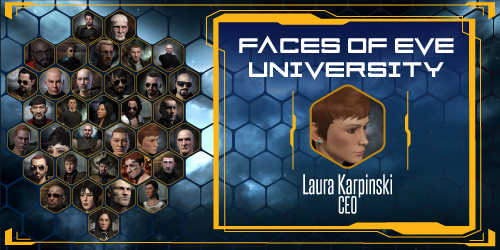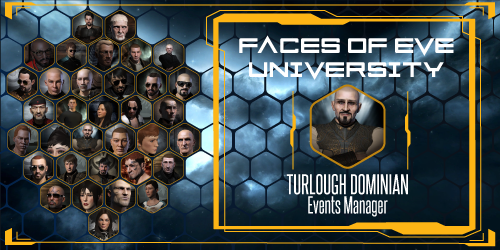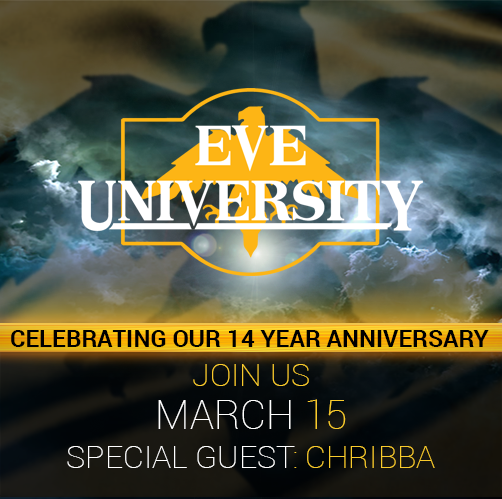
The Faces of EVE University are colorful and intriguing. With this interview series we want to bring to light some of the personalities that make up the staff of our alma mater, who tirelessly work to the advancement of learning.
For our second interview we had the chance to talk with the current CEO of EVE University: Laura Karpinski. She has been CEO for about one year now and gives us an amazing insight into the inner workings of the organisation. She also shares some personal experiences and talks about how she ended up in her leadership role.
How to become CEO
Hideo Date: So first off, thank you very much for taking the time to sit down and talk for a bit!
Laura Karpinski: That’s quite alright.
Hideo: For those who do not know you, could you tell us quickly who you are and what you do in EVE?
Laura: Sure. I’m the CEO of EVE University, which means I set the overall direction for the corporation and try and keep everyone going in that direction. I have a team of Directors who each look after their particular area of the corporation, and I keep in touch with all of them and make sure we are all on the same page.
Hideo: How did you find your way into EVE and then into the Uni?
Laura: My RL ex-boyfriend introduced me to the game. I wasn’t convinced it was the kind of thing I’d enjoy but I figured I’d give it a go. Six years later I’m still here. I joined EVE University because I was overwhelmed by the amount of information and the complexity of the game and I thought it would help me find my feet.
Hideo: So you stumbled into the game like every other player as well, that is kind of comforting. And now you are the CEO of EVE University. How did you end up taking this job?
Laura: I was Director of Operations to the previous CEO Azmodeus Valar for a year before I became CEO. That enabled me to learn the ropes under Azmo’s guidance. It meant that when Azmo decided to step down as CEO I was in a position to step into his shoes.
Hideo: To elaborate on that: What prompted you to take on a leadership role in the Uni in the first place?
Laura: Well it wasn’t what I set out to do. I joined EVE University twice. The first time I didn’t really engage with the community and didn’t learn very much. So the second time around I resolved to do things differently and to get involved as much as I could. That prompted me to apply to first join the staff as a personnel officer. I absolutely loved doing the work and as people moved on I was happy to take on more responsibility. So I became a senior personnel officer, assistant personnel manager, personnel manager, personnel director and ultimately director of human resources before moving to director of operations and then CEO.
Hideo: Looks like a nice career path to follow for aspiring members!
A glimpse into the University
Hideo: Let’s move on to the corporation it self. You kind of answered this in shorthand already, but maybe you want to elaborate: Could you give us a short overview of the structure and procedures in EVE University? And what is the focus of your daily work? A glimpse into the inner workings of the Uni so to speak.
Laura: Sure. So we have 9 Directors who are each responsible for their own area, for example education, logistics, human resources. Most have several departments or campuses that report to them, each headed by a manager. Of those, most departments and campuses also have staff who carry out the day to day work. What that means from a member’s point of view is that we can offer classes, mentors, hangars, ship replacement etc.
For me, my daily work mostly involves reading things. I try and keep an eye on all our Slack channels, chat channels and what is going on on the forum. I am the ultimate lurker, I like to know what is happening. Then a lot of my job is talking to people, either planning for the future with directors or trying to help resolve or prevent problems. There is always a lot of discussion going on behind the scenes, behind every change or decision.
Hideo: Ok, so as you have experience with this on all levels I would also like to ask you about one specific area: How does the recruitment process of the Uni work? And what do you look for in applicants?
Laura: Applicants put in an application to join. Like most other corps, this involves them giving us an API and filling out an application. We then have a two stage review process. Every application is given an initial review by one of our personnel officers, who may decide in some cases to accept them based on the application. If the personnel officer feels it would be beneficial to ask the applicant some more questions, they will place them in a queue for an interview. When the applicant gets to the top of the interview queue, they will speak to a personnel officer, who will then decide based on the interview whether to accept or reject the application. We accept the majority of applications, provided we don’t think the applicant is intending to do us harm, and provided they will fit into the community and benefit from being a member.
Hideo: So just as an aside: I happen to know about rumors that you are still in there and doing interviews yourself. Are you even now trying to get up your stats? Do you care to comment?
Laura: Haha they can’t keep me away from doing interviews, I love it too much.
Hideo: That is good to hear!
Learning Corporations
Hideo: Onto the next topic: What do you personally find appealing about a corporation focused solely on learning and teaching?
Laura: EVE is a complex game, no way about it. CCP are improving the new player experience but its still super overwhelming for new players to join in this massive universe where everyone seems to know everything. EVE University is one little oasis where new players can admit they don’t know stuff, and can learn it in an environment where people are not trying to screw them over, until they are ready to move on. I really like that.
Hideo: How do you see EVE University in relation to other learning corps? Is there a sense of competition, or more of coexistence?
Laura: Its an interesting development. When EVE University was first established 14 years ago there were not a lot of other corps teaching people to play the game. That has now changed completely, especially since the introduction of alpha clones. A lot of null sec blocs have their own teaching corp, which is great because it really brings the focus on new players and helping people get into the game. EVE University has always aimed to be neutral, for the reason that we want our graduates to have the widest choice of corporations to move on to when they leave us. So in that sense we offer something different from a lot of other teaching corps – a place to learn without pinning your colours too soon. So there’s not really a sense of competition for us. If a new player wants to live in sov null immediately we are not the best place for them, and we are happy to tell them that.
Hideo: What do you think are essential hallmarks for a successful learning corporation?
Laura: Every person learns differently, so I guess it is pretty subjective. I find EVE University tends to attract people who like to read up on things before doing them (our wiki is often the first way people hear about us), and who like to find their feet before they pick a side. But other teaching corps pride themselves on diving in, throwing caution to the wind and sometimes making mistakes, and have been very successful. That’s also absolutely fine. I don’t think there’s any one particular answer.
A look back
Hideo: Ok, so to wrap up: With the recent 14th anniversary of the Uni also marking your own first anniversary as CEO of our organisation, how do you look back at your term so far? What are the most important developments in the last year?
Laura: I’ve had a great time as CEO. I love the corp, I love the people and I love the game. My first year as CEO has involved a lot of learning, and lots of smaller changes to standardise things, or improve how they are done. There have been a few bigger changes as well. The Street Team is a great example – EVE University has recently had a fairly lowkey social media presence but the Street Team are really turning that around, getting out there and telling people about who we are and what we do. Another big change for us has been the trial of altered rules for attacking and defending structures, which has allowed our members to explore different areas of the game. The trial is still going on at the moment and we’re keeping an eye on how things go.
Hideo: Well, thank you very much for that encouragement, I think the whole team will be very pleased to read this! Lastly: Did you have any particular challenges to overcome as CEO?
Laura: I’m a bit shy and not too confident with speaking to large groups of people, so the first few times I held a management meeting or one of our Ask the Management Q&As were a bit nerve-wracking. I’ve done enough of them that I’m much more comfortable with it now, though.
Hideo: So do you have any closing statement to conclude our interview?
Laura: Nothing aside from thanks for taking the time to do these interviews, it’s a great chance for people to look behind the curtain and get to know the people who keep this corporation running.
Hideo: Well, thank you very much for taking the time to answer all my questions so openly!


